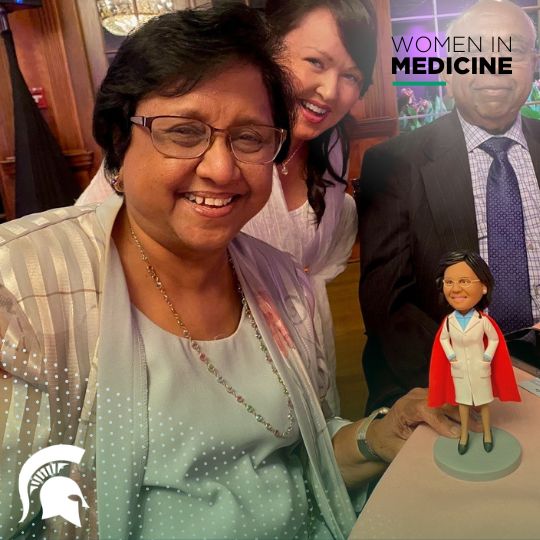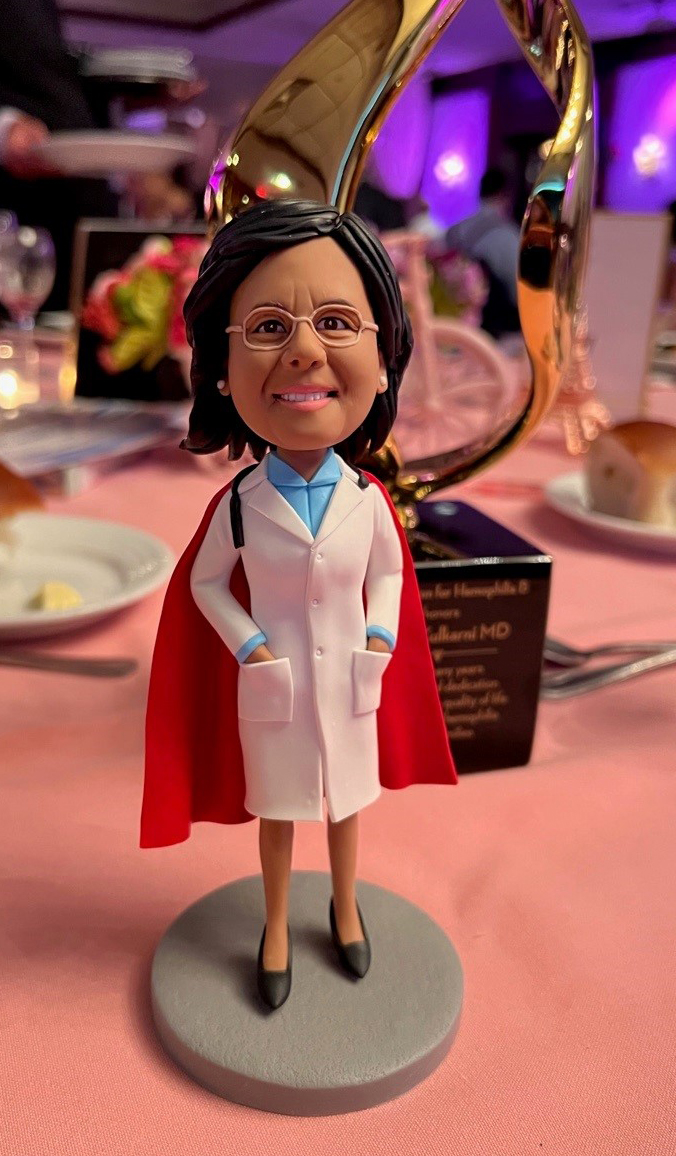Kulkarni Received Eternal Spirit Award for Career in Blood Disorders
September 27, 2022
In honor of Women in Medicine Month, the College of Human Medicine celebrates Roshni Kulkarni, MD, emeritus professor of Pediatrics and Human Development and emeritus director of the MSU Center for Bleeding and Clotting Disorders. She has dedicated her career to the research, advocacy, and treatment of patients suffering with blood disorders.
 Roshni Kulkarni knew she was to receive an award at a meeting of the Coalition for Hemophilia B, but she was a little surprised when, before the meeting, organizers asked her to send a photo of herself.
Roshni Kulkarni knew she was to receive an award at a meeting of the Coalition for Hemophilia B, but she was a little surprised when, before the meeting, organizers asked her to send a photo of herself.
“I thought they would give me a certificate,” said Kulkarni, MD, a College of Human Medicine emeritus professor of Pediatrics and Human Development and emeritus director of the MSU Center for Bleeding and Clotting Disorders.
The Eternal Spirit Award, it turned out, came with a rather unusual trophy: a bobblehead doll of herself.
The frivolity of the award, presented in August in Long Island, NY, in no way detracted from the serious work it honored. It was the latest of many awards Kulkarni has received for her research, advocacy, and treatment of people suffering with blood disorders.
Trained as a pediatrician, Kulkarni became interested in bleeding disorders after an aunt died of postpartum hemorrhaging. She completed a fellowship in pediatric hematology/oncology at Children's Hospital of Michigan, Wayne State University School of Medicine in Detroit in 1975.
The following decade brought more attention to bleeding disorders when many hemophilia patients were infected with HIV/AIDS after receiving transfusions with tainted blood products.
“I used to see so many patients affected by blood disorders,” Kulkarni said. “All of those things jelled.”
She joined the College of Human Medicine in 1977 and established the Division of Pediatric Hematology Oncology at MSU and was appointed Division Chief of Pediatric and Adolescent Hematology/Oncology. From 2006-2008, she served as director of the Division of Blood Disorders at the U.S. Centers for Disease Control and Prevention before returning to MSU.
“That position allowed me to bring more attention to blood disorders,” including sickle cell anemia, thrombosis, and bleeding disorders, she said. “It became a huge movement.”
In a hotel lobby in Boston, Kulkarni and other physicians discussed the lack of awareness, particularly among medical providers, of bleeding disorders in women and girls. Thus, in 2010 they founded the Foundation for Women & Girls with Blood Disorders, a nonprofit dedicated to achieving correct diagnosis and treatment of blood disorders and accompanying reproductive problems in women and girls.
 At the College of Human Medicine, Kulkarni held many positions, including director of the Michigan State University Center for Bleeding and Clotting Disorders, before assuming emeritus status in 2014 in the Department of Pediatrics and Human Development. She continued to be active and in 2014 established telemedicine and outreach clinics at Houghton Hancock in the Upper Peninsula. In 2015 she established the Women and Girls with Blood Disorders Lifespan Clinic, a collaborative effort with the MSU Department of Obstetrics, Gynecology and Reproductive Biology.
At the College of Human Medicine, Kulkarni held many positions, including director of the Michigan State University Center for Bleeding and Clotting Disorders, before assuming emeritus status in 2014 in the Department of Pediatrics and Human Development. She continued to be active and in 2014 established telemedicine and outreach clinics at Houghton Hancock in the Upper Peninsula. In 2015 she established the Women and Girls with Blood Disorders Lifespan Clinic, a collaborative effort with the MSU Department of Obstetrics, Gynecology and Reproductive Biology.
“I’m still working,” she said, and she plans to continue studying bleeding disorders and serving and advocating for patients and mentoring faculty nationally and internationally.
Throughout her career, she has received many grants for her work, published hundreds of research papers, served on dozens of committees and boards, and has taught, lectured, mentored, and given presentations about bleeding disorders all over the world.
She has received countless awards for her work – but only one that came with her own, personal bobblehead.
“I was clueless,” Kulkarni said. “I never, ever dreamed I would be a bobblehead one day.”

